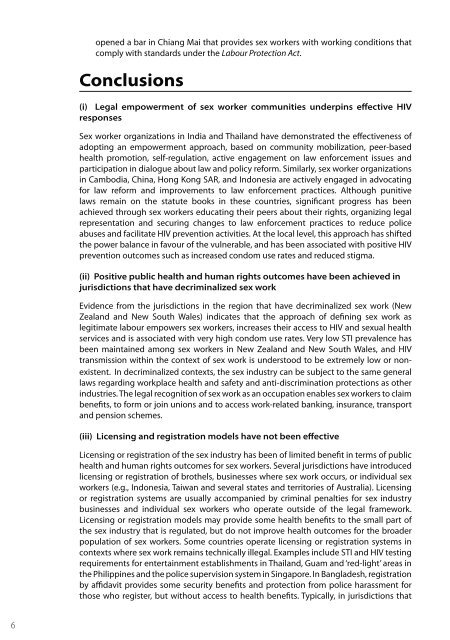SEX WORK AND THE LAW - HIV/AIDS Data Hub
SEX WORK AND THE LAW - HIV/AIDS Data Hub
SEX WORK AND THE LAW - HIV/AIDS Data Hub
You also want an ePaper? Increase the reach of your titles
YUMPU automatically turns print PDFs into web optimized ePapers that Google loves.
opened a bar in Chiang Mai that provides sex workers with working conditions that<br />
comply with standards under the Labour Protection Act.<br />
Conclusions<br />
(i) Legal empowerment of sex worker communities underpins effective <strong>HIV</strong><br />
responses<br />
Sex worker organizations in India and Thailand have demonstrated the effectiveness of<br />
adopting an empowerment approach, based on community mobilization, peer-based<br />
health promotion, self-regulation, active engagement on law enforcement issues and<br />
participation in dialogue about law and policy reform. Similarly, sex worker organizations<br />
in Cambodia, China, Hong Kong SAR, and Indonesia are actively engaged in advocating<br />
for law reform and improvements to law enforcement practices. Although punitive<br />
laws remain on the statute books in these countries, significant progress has been<br />
achieved through sex workers educating their peers about their rights, organizing legal<br />
representation and securing changes to law enforcement practices to reduce police<br />
abuses and facilitate <strong>HIV</strong> prevention activities. At the local level, this approach has shifted<br />
the power balance in favour of the vulnerable, and has been associated with positive <strong>HIV</strong><br />
prevention outcomes such as increased condom use rates and reduced stigma.<br />
(ii) Positive public health and human rights outcomes have been achieved in<br />
jurisdictions that have decriminalized sex work<br />
Evidence from the jurisdictions in the region that have decriminalized sex work (New<br />
Zealand and New South Wales) indicates that the approach of defining sex work as<br />
legitimate labour empowers sex workers, increases their access to <strong>HIV</strong> and sexual health<br />
services and is associated with very high condom use rates. Very low STI prevalence has<br />
been maintained among sex workers in New Zealand and New South Wales, and <strong>HIV</strong><br />
transmission within the context of sex work is understood to be extremely low or nonexistent.<br />
In decriminalized contexts, the sex industry can be subject to the same general<br />
laws regarding workplace health and safety and anti-discrimination protections as other<br />
industries. The legal recognition of sex work as an occupation enables sex workers to claim<br />
benefits, to form or join unions and to access work-related banking, insurance, transport<br />
and pension schemes.<br />
(iii) Licensing and registration models have not been effective<br />
Licensing or registration of the sex industry has been of limited benefit in terms of public<br />
health and human rights outcomes for sex workers. Several jurisdictions have introduced<br />
licensing or registration of brothels, businesses where sex work occurs, or individual sex<br />
workers (e.g., Indonesia, Taiwan and several states and territories of Australia). Licensing<br />
or registration systems are usually accompanied by criminal penalties for sex industry<br />
businesses and individual sex workers who operate outside of the legal framework.<br />
Licensing or registration models may provide some health benefits to the small part of<br />
the sex industry that is regulated, but do not improve health outcomes for the broader<br />
population of sex workers. Some countries operate licensing or registration systems in<br />
contexts where sex work remains technically illegal. Examples include STI and <strong>HIV</strong> testing<br />
requirements for entertainment establishments in Thailand, Guam and ‘red-light’ areas in<br />
the Philippines and the police supervision system in Singapore. In Bangladesh, registration<br />
by affidavit provides some security benefits and protection from police harassment for<br />
those who register, but without access to health benefits. Typically, in jurisdictions that<br />
6
















